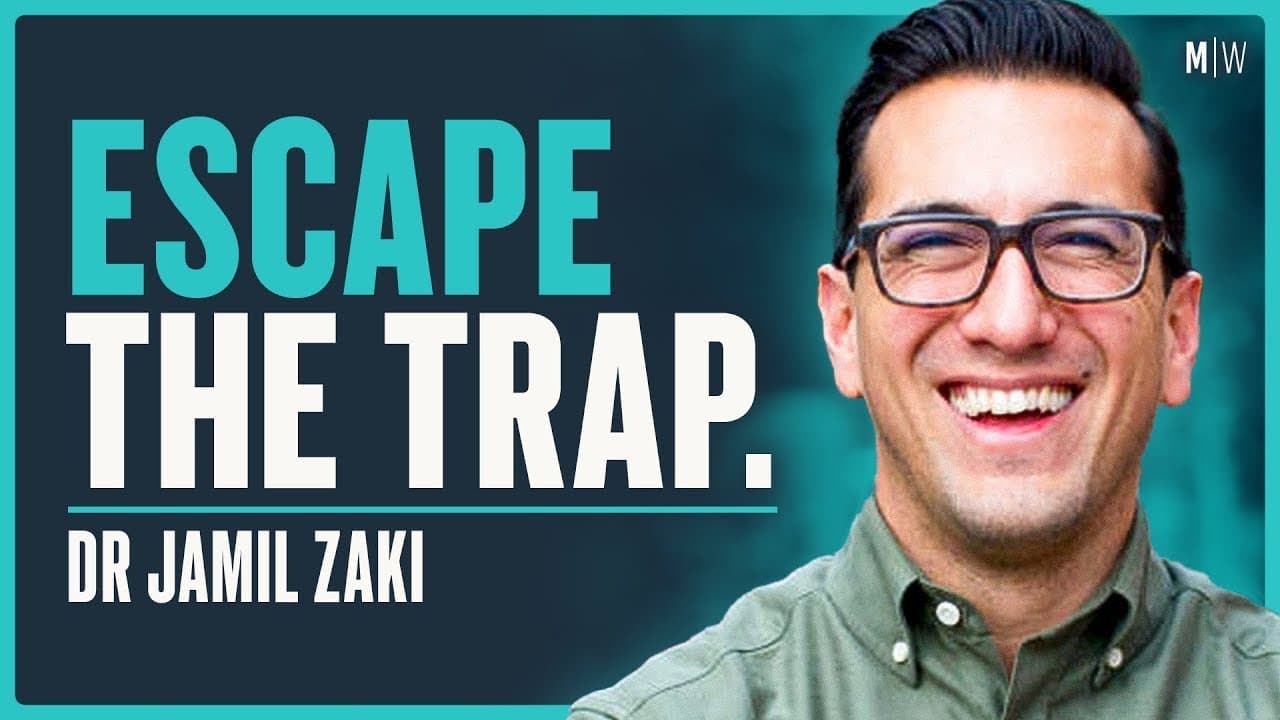How To Be More Hopeful In A Cynical World - Dr Jamil Zaki
21 Sep 2024 (1 year ago)

Why is Cynicism So Alluring? (0s)
- Cynicism, as defined in psychology, is the belief that people are inherently selfish, greedy, and dishonest, leading to a reluctance to trust others. (29s)
- Cynicism can manifest as an unwillingness to trust others, stemming from the belief that placing trust in others will inevitably lead to betrayal. (3m58s)
- Another behavioral manifestation of cynicism is engaging in preemptive strikes, such as spying, threatening, or acting selfishly, as a defense mechanism against anticipated betrayal. (4m37s)
The Cynicism Safety Blanket (6m10s)
- Cynicism is a defense mechanism to avoid disappointment and pain, often disguised as pragmatism. (6m18s)
- While cynicism might offer short-term protection from public failure, it can lead to long-term negative consequences such as depression, loneliness, heart disease, and a shorter lifespan. (8m34s)
- Cynicism is not a sign of intelligence or sophistication; it is a substitute for critical thinking and genuine engagement with evidence. (13m4s)
How to Spot a Cynical Person (15m11s)
- Cynicism can be measured using a questionnaire developed by Donald Cook and Walter Medley in the 1950s. (15m27s)
- Higher cynicism scores are correlated with negative outcomes including poorer physical and mental health, lower earnings, and shorter lifespans. (16m52s)
- Cynical leaders often experience less professional success due to their difficulty building trust and fostering collaboration, and their leadership style can negatively impact employee morale and behavior. (18m31s)
Is Cynicism Contagious? (22m5s)
- A single instance of negative behaviour in a group can lower the productivity of the entire group. (22m37s)
- Cynical thinking is contagious because it creates an environment where individuals are less likely to be vulnerable or take risks. (22m54s)
- Negative information, such as gossip about untrustworthy behaviour, spreads more quickly and has a greater impact than positive information, leading to an exaggerated perception of negativity within a group. (25m8s)
Can Someone Be Universally Cynical? (26m58s)
- Cynicism can be a global trait, but individuals can also exhibit cynicism in specific areas of their lives. (27m0s)
- While some compartmentalization of cynicism can be beneficial, true wisdom lies in adopting skepticism. (28m25s)
- Skepticism, unlike cynicism, involves approaching each situation with a fresh perspective and evaluating it based on its own merits, similar to a scientist conducting experiments. (28m37s)
How Cynicism Has Grown Over Time (30m51s)
- In the United States, cynicism has been increasing for at least 50 years, with a significant decline in the belief that most people can be trusted. (31m11s)
- A survey of 28 countries revealed that in 24 of those countries, most people reported a default tendency to distrust others. (31m45s)
- Increased media consumption, particularly of news and social media, is correlated with a more negative outlook on the world and humanity. (33m58s)
Does Childhood Impact Cynicism? (37m9s)
- There is a genetic component to cynicism, but it is a minor factor. (37m31s)
- A more reliable predictor of cynicism is one's home environment, particularly their attachment style in childhood. (37m33s)
- Insecurely attached children, who often feel alone and unsafe, tend to become less trusting adults. (38m8s)
Tools to Combat Cynicism (41m28s)
- To combat cynicism, one should challenge cynical thoughts like a scientist by looking for evidence to support them. (41m42s)
- People should be aware of the reciprocity mindset, which means that trusting others can lead to them becoming more trustworthy. (42m51s)
- To fight against negativity bias, it is helpful to keep a record of social interactions to compare actual experiences with perceived experiences. (47m21s)
Why This Was Personal for Jamil (56m5s)
- For 20 years, research has focused on positive aspects of human nature like kindness, empathy, compassion, social support, and friendship. (56m44s)
- Despite studying these positive aspects, cynicism has been a personal struggle since childhood, stemming from a chaotic home life and difficulty trusting people. (57m21s)
- A conscious effort is made to take more "leaps of faith" in social interactions, choosing to be vulnerable and trust others despite past experiences and fears. (59m49s)
Advice for People Who Want to Take More Risks (1h3m48s)
- People should take social risks in the same way they take risks in other areas of their lives where they want to achieve something great. (1h5m49s)
- People are often encouraged to be risk-seeking in areas like careers or athletics, but not socially. (1h5m27s)
- Social risks, such as being vulnerable and opening yourself up to friendship, collaboration, and love, are essential for social fulfillment. (1h5m42s)
Where to Find Jamil (1h7m27s)
- Contact information including a website and book title are provided. (1h7m34s)
- The Social Neuroscience lab at Stanford University is mentioned. (1h7m45s)
- Gratitude is expressed for the conversation and well wishes are shared. (1h8m4s)